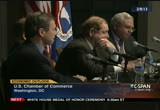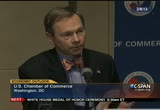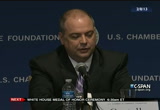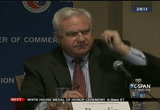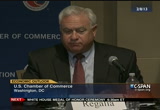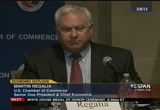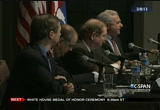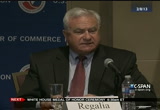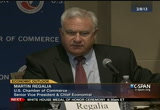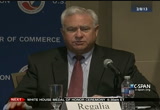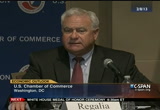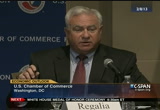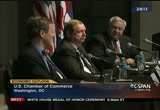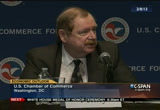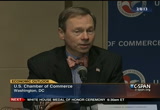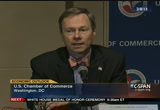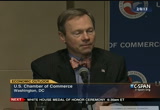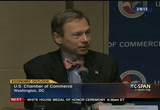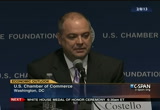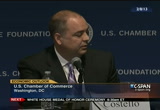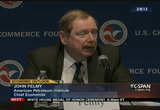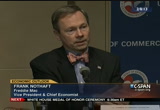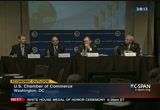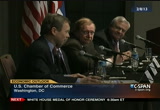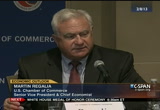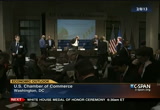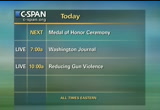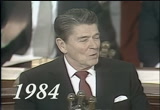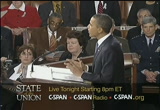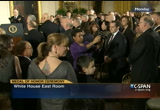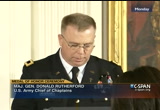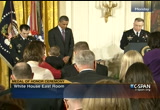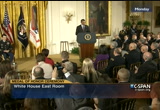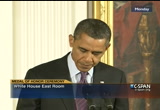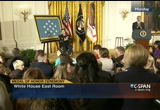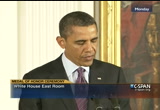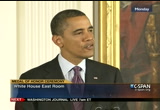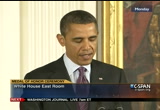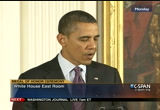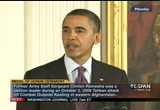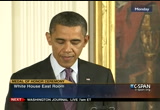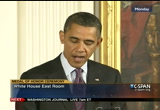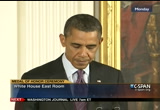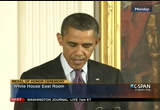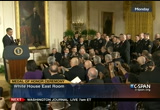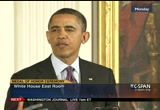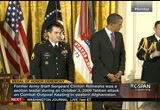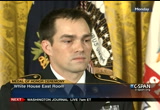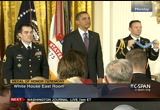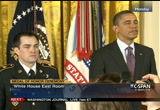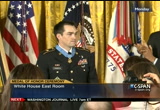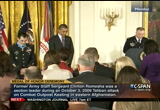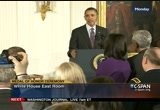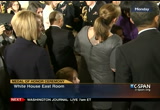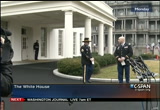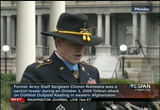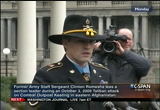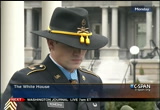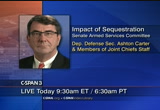tv Politics Public Policy Today CSPAN February 12, 2013 6:00am-7:00am EST
6:00 am
pretty anemic glee as well for three and a half years. there have been a couple of good quarters and their quarters. the fourth quarter was one of those bad quarters, from the top line number. i kind of foo fooed a little in my presentation because when you start to peel the onion down ec consumption growth was actually stronger in the fourth quarter than the third quarter. the big negatives, it was federal spending, pretty much defense spending. and then there was this inventory bulge. how you guys look at the fourth quarter compared to the first half of this year? is it a harbinger of things to come or doesn't look more like an aberration. i will start with frank first. >> i think it was a bit of an aberration. and one of the real positives i saw in the fourth quarter was the contribution from the housing sector, and that is primarily residential. for much of the recovery, housing has not been there. housing continue to weaken and
6:01 am
be a net subtraction from economic activity in 2009, 2010, 2011. finally in 2012, housing began to contribute. it contributes to through the pickup of home sales, housing starts and floated through residential fixed investment. fourth quarter, residential -- residential fixed investment contributed about 0.4% of overall and gdp growth -- or helped it be less negative. what we were expecting to see is we would see a bigger role for housing in supporting economic growth in 2013. we are expecting 2013 housing for residential fixed investment will contribute close to half a percentage point in overall gdp growth. >> i am in the same vote. i am not overly concerned about the reading.
6:02 am
i was concerned about inventory levels throughout the supply chain. something we will -- we were hearing from the members, other customers and of course a showing up in sales ratios. a big chunk of the negative was a destocking, if you will, in the supply chain. while the purchase trucking -- and many of our numbers were off year over year period in the fourth quarter, even more so than the gdp reading, i actually look at this as a positive. if we get inventories back to where they need to be it will help volumes this year and get things right, if you will. i am not overly concerned. we did like to see the business investment and household consumption picks up. >> i saw the fourth quarter as a continuation of what we have
6:03 am
seen through the recovery. weak gasoline demand -- that is driven by employment, sales, and that is consistent. yet for much of the recovery fairly strong diesel demand. but then you start to see a shift through last year, 2012. with lower diesel demand in the fourth quarter relative to gasoline. as i mentioned, going forward, we have seen a continuation of low diesel demand, preliminary data but we have seen a rebound in gasoline, which is consistent with some of the sales data, and so on. it seemed like the ship is turning a little bit. >> if you have a question, put up your hand. we will bring a microphone around. identify yourself and direct your question to anyone up here and we will see what we can do with it. do we have any takers out there? i think we have one back here. >> exxonmobil.
6:04 am
part of my question to you -- sometime of the next few months, to the point of your remarks, we are going to be faced with either sequestration or beginning of some kind of reduction in government spending. did you give us your sense of how you think it might play out and what the implications might be for the economy? given the fact that consumer spending is still probably about 70% of the gdp, the implications for the consumer? >> i think sequestration, the worst aspect of sequestration is not the overall cut. because we know we need to trim spending and we need to cut or change the trajectory of our spending going forward, predominantly entitlement spending -- medicare, medicaid, and social security. without that, i do not they will ever get our budget under control and at some point we will be downgraded by the other
6:05 am
rating agencies and that some pulled the we will start to see interest rate increases and the people that hold our debt around the world less interested in holding it at very low interest rates. all of this will affect the u.s. economy. that having been said, when i look as sequestration, i do not look at the cuts per se impact the economy in a negative way. it will not help growth in the short term, but it has offsetting factors which medicaid the negative . the problem with sequestration is the way the cuts will take place. what we tell our congressmen and senators when we send them to washington -- that is why we send them here. we send them here to spend money. that is absolutely what we do in an economic sense. we expect the federal government to provide public goods -- roads, infrastructure, education, national defense. and so, we spend -- send them here to spend. we know in order to pay for
6:06 am
those goods we know we have to tax. that is what they are here to the. to spend and tax. what we hope they do is prioritize. we hope we look -- delegate was out there and say, what do we need to do first, how much the way to do and only do that. and sequestration flies in the face of that reason for sending them here. it obviates the need -- in fact, it legislates against prioritization. we tell them -- go out and lob everything the same. everybody who has ever done a budget, where the division of budget, department budget, company budget, those the ball game and we all had a little bit here and there and we put a project in here that maybe we do not really need and we know if we get cut, we will cut that one first. with this -- no, we cannot do
6:07 am
that. it is stupid policy. so, what we ought to do is figure out a way to prioritize the cut. think about it -- that was the job of the super committee. there was an agreement made a year and a half ago that you would get that's really increase and there would be $1.20 trillion in cuts and then the second -- the super committee was supposed to put together. they were supposed to prioritize. they were select members of the congress that were supposed to prioritize. and they didn't do what. and kind of knowing they might not do it, congress and we will put something in there so dumb, so draconian, so stupid, that nobody would let it happen. lo and behold, that is what we are dealing with now. that is a sad state of affairs from the political process. it is a very sad state of affairs. so, now to come back and say, what should we do with
6:08 am
sequestration? i find it amazing, the president who talks so much about balance and fairness, a year ago balance getting the budget under control simpson-bowles -- four dollars of spending for every dollar in tax increases. then when we went along with all the discussion tide shifted. at the election prospects rose and fell, that balance is suddenly became two to one december after the election, the talk was kind of one to one. when we actually saw the deal done, it was zero to one -- 0 spending cuts to the tax increases. and now we're actually very negative to one. it is not two to one, negative 21. he wants to count the cuts already made in the future and he wants to replace the agreement was with us you would do the stupid sequestration policy of congress could not come up with a prioritized cuts. and we are going to replace
6:09 am
those cuts with more tax increases. and, by the way, john, thanks for stepping up. ok? because -- they are all aimed at oil and gas industries. so, this is not good public policy. what we would like to see is some prioritization. should we just do away with the cuts? that of not a good thing to either, because when we look down the road we have not established a sustainable fiscal policy. we still have a policy does either under the most optimistic forecasts, economic policy -- economic forecast, starts to turn up and the debt to gdp ratio starts to rise. if you look at interest rates assumptions underlying those, those are pretty pollyannas because there are virtually no increases in interest rates the next couple of years, even though growth picks up. even beyond that, very modest increases in interest rates. with the $16 trillion in debt,
6:10 am
you got to -- every percentage point increase in interest rates at about $160 billion to the debt service bill. and that very quickly starts to cause an increase in spiral. i work with cbo a couple of millenniums ago. we used to worry about deficit to gdp ratios of 5.5 to 6% because that is the range they could start to spiral out of control. we have not seen anything remotely close to the deficit to gdp ratio of 6% the last four years. and, by the way, even under the best assumptions of cbo, we are looking at another 2-3 years before we get below that 5.5% rate. i think we need to cut. the cuts need to be made. and they need to be prioritized. because those cuts across the board are going to affect some industries more than others. the defense industry is going to be impacted more than others.
6:11 am
we have to make a decision how we want that to play out. we have -- do not have that discussion. just obviate the need with across-the-board cut. it is not good public policy. i think the cuts are necessary. i don't think the cuts are so large that if they were instituted, if the congress were to sit down and pick and parts as the approach. cut, that those would lead to an economic downturn. the forecast that cbo and others came out with when we were talking about the fiscal cliff, we would lose $500 billion or more in sequestration spending and increase taxes if you did nothing. and that of $500 billion or $550 billion total would cause a mild recession of something on the order of half a percent to 0.3% to 25% of gdp. if you look at the forecast. now talking about sequestration,
6:12 am
virtually one fifth. we have seen tax increases, possibly another fifth. looking at something possibly 40% of that. i did not see a recession, because of that. and i think what was not factored into that -- because in many cases, a cbo river to back to their static approach -- you did not look at what is happening in housing, which i think could be better than what any of us think is happening. i do not think we are looking at the energy sector, which has done tremendously well and could expand as well and do better under the next few quarters as it did over the past. pushingn't think it is us back into recession and i think if we prioritize the cuts -- that it would set the stage for doing even more of that down the road. any of you want to add anything to my soliloquy? >> in terms of energy, you are absolutely right. we have an opportunity to move forward to generate jobs, the,
6:13 am
and energy security. it will take conscious decisions in making decisions about -- keystone xl pipeline. you will immediately start generating jobs and all the indirect effects. but unfortunately what we have is a debate against it for some reason that somehow the opponents of canadian oil stands thinks stopping keystone xl will stop developing the oil sands. it is not true. the oil sands are worth something like 10 times the gdp of canada. the notion it would not be developed is silly. if you really believe in environmentalism you'll bring that oil here because it's lower emissions. we need to make decisions in terms of exports of energy. we have an opportunity with so much gas we are producing that we can export it at a good price, which keep jobs in this country. so, there are real positive things we could do beyond the budget process that will help the economy right now.
6:14 am
>> frank? >> other questions? i think we have one over here. >> hello -- but the american public transportation association. frank, you of interesting facts on some of the subsets and housing market. rentals, multifamily homes -- realizing you are not a realtor but an economist, might you have any observations of new trends in housing, perhaps trends caused by the bubble or caused by generational changes or anything housing market? >> thanks for the question. one thing that keeps coming up is has the desire or believe in home ownership changed in some way compared to attitudes is several years ago? my take on the survey that has been done over the last few years is that desire for home ownership at some point in the life cycle really has not
6:15 am
changed. the young families today that are being formed, creating households, still have that same desire long-term for home ownership as older coleworts -- cohorts or their parents. but they recognize, gosh, i've got to put my financial house in order first. i've got to say about more money. i think there is recognition that maybe a little larger down payment and may be delayed the time at which they become the first time homeowner. what i think we will see over time is that today's young families will have the same ultimate home ownership rate over their life cycle. it is just that they may delay the time at which they become a first-time homeowner. over one's life cycle, about close to 90% of households
6:16 am
become a homeowner at some point in their life cycle. that is not the homeownership rate you see in the news. the census bureau brings out homeownership rates, 55% or so -- that is a little different number that i am talking about. home ownership rate is the third set -- percent of household today owners versus renters. but mixed into it households of many different ages. the young cohorts and older -- a vote -- and over one's life cycle, about 85% to 90% of all households are homeowners at some point of the life cycle. that has not changed, but the age at which people choose to become a first-time buyer and transition to home ownership may have changed. i think it is probably going to be delayed relative to what we were seeing several years ago. >> household formations are up.
6:17 am
not up to the trend but higher than the last couple of years so it may take longer for this group to get in there. but the group is getting bigger. >> absolutely right. 1 million net new households -- the most in a few years. with a tough economy, net household formation has been reduced but the projection for return is the rate of household growth will continue at about 1.2% a year, the long-term projections. we currently have about 120 million households in the u.s.. if you do the math, it works out to something like 1.4 million net new households per year longer-term. we are still below that but we did have a pretty good year with net household formation. i think the trend is looking pretty good. which is good, actually, if you are a home builder and have been able to survive the downturn so far. >> the net new formation, that is net of the 30-year old kids moving back with us.
6:18 am
that is what take away, isn't it? [laughter] i keep trying to explain to them that is the take away but i am not sure i can convey it appropriately. >> it is net. the folks who move back into their basements. >> when you look out there and we looked at these fiscal problems and we look at the discussions, we have a state of the union coming up next week. what in your area of would you wish for -- what would surprise you and what would you expect? i will start with bob in the middle and we will work to the extremes. >> one of the things trucking has been struggling with for a number of years -- and, of course, the chamber has been a great partner with us on this issue. we are not investing enough in our infrastructure. that is good government
6:19 am
spending. that creates a lot of jobs. it creates productivity in the long run. and you actually have a mystery here. how many industries do this? you have an industry that has been saying for years, please tax me more. we want the fuel tax to go up. so, we would love to see some progress made on this. we have gotten so desperate in this area that we are now talking about perhaps there needs -- because politicians can't make a decision on this and haven't sent the early 1990's on the federal level -- maybe we need to go to indexing of the fuel tax. >> you are talking about a fuel tax for infrastructure and not to pay for subsidies, right? [laughter] >> you always get one sold off against the other. what we need is more infrastructure, and that is a public good and it needs to be paid for. and generally with tax revenue. i do not think anybody is faulting that. i think it is sold with a higher
6:20 am
fuel tax and we could use that to either reduce the deficit and pay for something else. the fuel tax was intended to pay for infrastructure. that is what you're talking about. >> absolutely. diverging it in the -- we are not too happy about that. >> john, what are you hoping for next week question of >> for some reason, i have not been consulted on that. the president and his campaign said he was for all of the above energy policy. let's have an ounce to support that. let's move forward with the big decisions like keystone xl, leasing decisions, five-year plan, the things you need to do to be able to accomplish and all of the above policy. i would say i would like to see -- stopping the discussion about taxing the industry and trying to characterize it as subsidies, which is not true. and i would like more
6:21 am
opportunities and terms where we can open up areas that off- limits right now. because all of those combined can generate an enormous amount of opportunity in the economy right where we needed. >> frank? >> i would just mention a couple of things. one thing i think lenders have been really concerned about, the implementation of new regulations and rules that affect lending in the housing market. so to the extent we can get more clarity and certainty as to what that framework will be like going forward, that thing then lenders can take advantage of some of the flexibility. once they know what the rules are in extending credit. the other thing i would mention -- not a particularly sexy topic but an important one -- financial literacy for younger people. trying to maybe reach out to the industry to try to come up with ways to really promote financial literacy and education before college level. getting into the high schools.
6:22 am
so that we have an educated group of young folks who come out and understand about the importance of having the financial house in order. the importance of having a good credit history. understanding what it means to be smart about using credit -- whether it is mortgages or consumer credits or even student loans. >> thank you. one last call for questions, if there's any out there. can we get a microphone over here? and we will end this on time. >> i represent mobile technology, mobile brand -- broadband providers. i am sure all the smartphones and tablets of of the trucking industry and oil and gas is probably using more. anything the panel can say generally about the continued growth in mobile broadband and technology generally? >> certainly from a trucking perspective, gas, it has been absolutely critical to our industry over the last decade or so. the days of drivers going to pay
6:23 am
phones and calling in to find the next load, now it pops up and tell them exactly where to go and when to be there and so forth. i think there is still a lot of penetration -- the penetration is probably not all the way there yet in trucking and there are a lot of opportunities. that is something they are willing to invest in and because it impacts their bottom-line. >> i would agree. the ability of well drillers to capture what is going on in terms of logs and distributed to a central location for analysis , and understanding what is going on, is really central to moving forward to develop our energy resources much more quickly and efficiently. >> when bob mentioned payphones, a chuckled a little bit. do they still exist? [laughter] >> i think this has been an interesting discussion. it is an economy, when you look
6:24 am
at it, there's a whole list of positives -- housing, energy, fed policy. what is happening in the energy area and what is happening even in europe and abroad. and then there's a list of negatives and virtually every one of them is self-inflicted. we have a potential, i think, finally to see the economy break out of the doldrums. push it above the 2.3%. it may be significantly above it. but i think our policy options are what is holding us back. what i would like to see and hear in the state of the union is a real plan for addressing our long term deficit over a reasonable length of time, one that actually does recognize and specifically address what is going on on the spending side and tells us what they are thinking specifically on the tax side, so that some evaluation
6:25 am
can be made. i think it would go a long ways toward stimulating a debate on entitlement and tax reform in the congress, and that, i think, would be a net plus for the economy as well. it is not all bad news -- even though it is a lousy, rainy day. i want to thank all of you for coming and i hope we can do this again in a couple of months. thank you all very much. [applause]
6:26 am
[captioning performed by national captioning institute] [captions copyright national cable satellite corp. 2013] >> in a few moments, yesterday's white house medal of honor ceremony. "washington journal" is live with the state of the union speech, lobbying rules and mental health policy. at 10:00 eastern, senate judiciary subcommittee holds a hearing about reducing gun violence. live events to tell you about -- a senate judiciary subcommittee holds a hearing on reducing gun violence, here on c-span at
6:27 am
10:00 a.m. eastern. before that, 9:30 a.m. eastern on c-span 3, a senate armed services committee hearing on the impact of upcoming federal spending cuts, known as sequestration. members will hear from deputy defense secretary and the members of the joint chiefs of staff. and the armed services committee will meet again this afternoon to vote on the nomination of chop kagel to be secretary of defense. but is also on c-span 3 at 2:30 p.m. eastin -- chuck hagel as secretary of defense. >> having observed a steady improvement in the opportunities and well-being of our citizens, i can report to you that the state of this old but youthful union is good. >> once again, in keeping with time-honored tradition i have come to report to you on the state of the union. and i am pleased to report that america is much improved. and there is good reason to believe that improvement will continue in the days to come.
6:28 am
>> my duty tonight is to report on the state of the union. not the state of our government. but of our american community. and to set forth our responsibilities, and the words of our founders, to form a more perfect union. the state of the union is strong. >> as we gather tonight, our nation is at war, our economy is in recession, and the civilized world faces unprecedented danger is. yet the state of our union has never been stronger. >> it is because of our people that our future is hopeful, our journey goes forward, and the state of our union is strong. >> tonight, president obama delivers a this year's address live on c-span. with our preview program starting at 8:00 p.m. eastern and president's at 9:00, followed by the gop response and
6:29 am
your reaction. tonight on c-span, c-span radio, and c-span.org. >> president obama awarded the medal of honor to former army staff sgt clinton romesha -- the fourth living veteran of the wars in iraq and afghanistan to be given the medal of honor. this is half an hour. ♪ >> ladies and gentlemen, the president of the united states and mrs. michelle obama, accompanied by medal of honor recipients staff sgt clinton romesha. ♪ ["hail to the chief"]
6:30 am
>> let's pray. eternal god, from whom we come to whom we belong, and in whose service we find peace, such as written to be found in the spirit of truth and justice. on yourselves. the you men of valor -- of valor. -- the men of valor, retinas for the conflict. be ready for the conflict. better to paris and that all of them look upon it out origination. today, lord, we recognize men of valor, who in readiness for the conflict, the battle came upon them. their sacred story is one of life and death, suffering of servants faithfully rendered at the moment of truth. they belong to that small band of black knights.
6:31 am
and a nation grateful for the men who follow and the men who lead. we offer our gratitude for the actions of those men that day and for the actions of arthur rhodes, an intense man, short and wiry. thank you for claiming their sacred story and writing it into our nation's history. we distill our highest honor on staff sergeant romesha and recognize his actions that day. we pray your abiding grace and eternal mercies upon the families, the friends who gave the last full measure of devotion that day. staff sgt vernon martin. sergeant michael cusack.
6:32 am
specialists stephen manes. and pse kevin thompson. we ask your blessing on all of our servicemen and women and at home and abroad to support and defend our constitution. grant them guidance. may have example guide our service and inspire our devotion. we ask this in your holy name. amen. >> please, be seated, everybody. good afternoon. on behalf of mashal and myself, -- on behalf of michelle and myself, welcome to the white house. every day at the white house we received thousands of letters from folks all across america and at night upstairs in my study i read a few. about three years ago i received virginia.
6:33 am
-- from a mom in west virginia. her son, just 21 years old, had given his life in afghanistan. she had received the condolence letter that i sent to her family, as i send to every family of the fallen. and she wrote me back. mr. president, she said, you wrote me a letter telling me that my son was a hero. i just wanted you to know what kind of hero he was. my son was a great soldier, she wrote. as far back as i can remember, steffan wanted to serve his country. she spoke of how he loved his brothers, how he would do anything for them, and of the brave actions that would cost
6:34 am
him his life, she wrote, his sacrifice was driven by pure love. today, we are honored to be joined by stephan's mother, vanessa, and his father, larry. please stand, vanessa and larry. [applause] we are joined by the families of the seven other patriots who also gave their lives that day. can we still -- can we also have them stand, so we can honor them as well? [applause] we are joined by members of bravoed troops, whose courage that day was driven by pure
6:35 am
love. and we gather to present the medal of honor to one of the soldiers, staff sgt clinton romesha. highestour nation's military decoration and it reflects the gratitude of our entire country. we're joined by members of congress, leaders from across our armed forces, including the secretary of defense leon panetta, chairman of the joint chiefs of staff marty dempsey, army secretary john mchugh, and army chief of staff general rhey gauthier now. we are especially onerous -- general ray odierno. are specially liked to be joined by the iron horse division. and the medal of honor society
6:36 am
who today welcome you to the ranks. you may have a sense that clinton is a pretty humble guy. we just spent some time together in the oval office. he grew up in lake city, calif., population less than 100. we welcome his family, including mom and dad, tisch and gary. i hope you do not mind that we share that he was actually born at home. these days, clinton works in the oilfields of north dakota. he is a man of faith. and after more than a decade in uniform, he says the thing he looks forward to the most is just being a husband and father. in fact, this is not even the biggest event for clinton this week. because tomorrow, he and his wife, tammy, will celebrate their 13th wedding anniversary.
6:37 am
this is probably not the intimate kind of anniversary you -- planned. [laughter] arewe're so glad that you here, along with your three children. colin is not as shy as clinton. [laughter] he was racing around the oval office pretty good. and he sampled a number of the apples before he found the [laughter] -- the one that was just right. [laughter] to truly understand the act -- the extraordinary actions for which clinton is being honored, you need to understand the almost unbelievable conditions under which he and his troops serve. -- b troop served. this is a time in 2009 when
6:38 am
many of our troops still served in small, rugged outposts, even as our commanders were shifting the focus to larger towns and cities. combat outpost keating was a collection of buildings of concrete and plywood and trenches and sandbags. of all the outposts in afghanistan, keating was among the most remote. it stands at the bottom of a steep valley surrounded by mountains. terrain that a later investigation said gave ideal cover for insurgents to attack. the investigation found that it was tactically indefensible. that is what the soldiers were asked to do, defended the indefensible. the attack came in the morning just as the sun rose. some of the guys were standing guard. most, like light, were still sleeping. the explosions shook them out of their beds and sent them rushing for weapons.
6:39 am
and soon, the odds became clear. these 53 americans were surrounded by more than 300 taliban fighters. what happened next has been described as one of the most intense battles of the entire war in afghanistan. the attackers had the advantage, a high ground, the mountains above. and they run the machine -- they were unleashing everything they had, rocket-propelled grenades, mortars, snipers taking aim. to those americans coming -- to those americans down below, the fire was coming from every direction. they had never seen anything like it. with gun packed -- with gunfire impacting all around them, clinton raised to one of the barracks machine guns. he took aim at one of the enemy teams and took it out. a rocket-propelled grenade exploded, sending shrapnel into his hip, his arm, and into his neck. but he kept fighting, disregarding his own wound, and
6:40 am
tending to an injured conrad instead. then over the radio came words no soldier ever wants to hear. enemy in the wire. the taliban had penetrated the camp and were taking over buildings. -- at times as close as 10 feet. when clinton took aim at three of them, they never took another step. but still, the enemy advance. the americans pulled back to buildings that are easier to defend to make one last stand. one of them was later compared to the alamo -- one of them later compared it to the alamo. keating, it seemed, was going to be overrun. and that is when clinton romesha decided to take the camp back. he gathered up his guys and they began to fight their way back, storming one building, then another, pushing the enemy back, having to actually shoot
6:41 am
up at the enemy in the mountains above. by now, most of the camp was on fire. amid the flames and smoke, clinton stood in the doorway, calling in an airstrike that shook the buildings around them. over the radio, they heard comrades pinned down in a humvee. clinton and his team unloaded everything they had into the enemy positions, and with that cover, three wounded americans made their escape, including a grievously injured stephany spirit -- steffan mace. but more injured were out there. -- more americans, their bodies, were still out there. clinton and his team started charging as enemy fire poured down. and it kept charging, 50 meters, 80 meters, ultimately, a 100-meter run through a hail of bullets. they reached their fallen friends and they brought them
6:42 am
home. throughout history, the question has often been asked, why. why do those in uniform take such extraordinary risks? and what compels them to such courage? if you ask clinton and any of these soldiers here today, they will tell you, they fight for our country and for our freedom. they fight to come home to their families. most of all, they fight for each other, to keep each other safe, and to have each other's backs. i called clinton to tell him that he would receive his medal. he said he was honored, but he also said, it was not just me out there, but a team effort. so today, we also honor this american team, including those who made the ultimate sacrifice. private first class kevin thompson, who would have turned 26 years old today.
6:43 am
sgt michaels cusack -- michael scuza. sgt joshua kirk. sergeant christopher griffin. staff sergeant justin gallegos. staff sgt vernon martin. sgt joshua heart. and a specialist steffan mace. each of these patriots gave their lives looking out for each other in a battle that raged all day. that brand of selflessness was displayed again and again and again. soldiers exposing themselves to enemy fire to pull a comrade to safety. tending to each other's loans, -- wounds, performing transfusions, giving each other their own blood. if you seek a measure that day, you need to look no further than the ribbons and medals that grace their chests. for their sustained terrorism,37 army commendation medals. -- for their sustained heroism,
6:44 am
, 37 army commendation medals. for their valor, 18 bronze stars. before their gallantry, nine silver stars. these men were outnumbered, outgunned, and almost overrun. looking back, one of them said, i'm surprised that we made it out. but here they are today. and this -- i ask this band of brothers to stand and except the gratitude of our entire nation. -- accept the gratitude of our entire nation. [applause]
6:45 am
there are many lessons from this event. one of them is that our troops try never, ever be put in a position where they have to defend the indefensible. but that is what the soldiers did for each other in sacrifice driven by pure love. and because they did, eight -- eight grieving families were able to welcome their sons home one last time, and many are there to carry on to keep alive the memories of their fallen brothers, and to help us to -- make sure this country we love so much remains strong and free. how was it -- what was it does turn the tide? remains strong and free. how so few americans prevailed against so many, as to prepare for the citation, i will leave you with the words of clinton
6:46 am
himself. because they say something about the army and something about america. they say something about our spirit, which will never be broken. "we were not going to be beaten that day. we will not back down in the face of diversity like that -- adversity like that. we're just going to win, plain and simple." god bless you, clinton romesha, and all of your team. god bless all who serve, and god bless the united states of america. with that, i would like the citation to be ready. >> the president of the united states of america, authorized by act of congress, march 3, 1963, -- 1863, has awarded in
6:47 am
the name of congress the medal of honor to staff sergeant clinton romesha, u.s. army, force -- for conspicuous gallantry and intricately above and beyond the call of duty. staff sgt distinguished itself -- clinton romesha this in which and self at the risk of his life above and beyond the call of duty while serving in the fourth brigade combat team, fourth infantry division, during combat against an enemy in afghanistan on october 3, 2009. on that morning, staff sergeant romesha and his comrades awakened to an attack by an estimated 300 enemy fighters, employing concentrated fire from a rocket-propelled grenade from anti-aircraft machine guns, and small armed fighter -- fire as well as mortars. they were compelled to seek reinforcements from the barracks before returning
6:48 am
action. staff sergeant romesha to god -- took out -- and an enemy machine-gun team, and while engaging a second, the generator he was using for cover was struck by an rpd, and looking him with shrapnel wound. undeterred by his injuries, he continued to fight and upon the arrival of another soldier to aid him and the assistant gunner, he then assembled as it -- additional soldiers. he mobilized a five-man team and it returned to the fight equipped with a sniper rifle. with out regard to his own safety, he consistently exposed himself to enemy fire as he moved confidently about the battlefield, killing many enemy fighters. while orchestrating a successful plan to secure and reinforced key point of the battlefield, staff sergeant romesha maintain communication through radio with the tactical
6:49 am
operations center. as the enemy forces attacked with greater ferocity, staff sergeant romesha identify the point of attack and directed air support to destroy over 30 enemy fighters. after receiving reports of seriously injured soldiers at a distant opposition, he provided covering fire for them to safely reach the aid station. upon receiving the next objective, his team pushed forward 100 meters over -- under overwhelming enemy fire to prevent the fighters from taking the bodies of their fallen comrades. his heroic actions throughout the day-long battle were critical in suppressing far greater numbers. his efforts gave the opportunity to reorganize and prepare for a counterattack and allowed the trip to account for its personnel and security outpost. his discipline and extraordinary heroism above and beyond the call of duty reflect
6:50 am
6:51 am
[applause] >> let's pray. almighty god, we have gathered to give recognition to the spirit that made our country great, the willingness to give totally of ourselves even unto death. the great blessing of being a part of this country with the honor example of staff sergeant romesha, for this, we'd bring you thanks. we were deeply blessed by his presence. as his ancestors inspired his service, they inspire greater generations into service.
6:52 am
in your strength, to protect others, your providence that we would be kept safe and we return our hearts to you each and every day and we ask this in your holy name, amen. >> thank you, everybody. most of all, thank you for plant -- clinton and the entire team and their extraordinary devotion and service to our country. we will have an opportunity to celebrate. there will be a wonderful reception. i hear the food around here is pretty good. i know the band is good. and colin really needs to get down [laughter] enjoy, everybody. give our newest recipient of the medal of honor a big round of applause once again [applause] [applause]
6:55 am
and in a moment i will introduce clint romesha. he has a few remarks to me. unfortunately he will not be taking in a question today. if you have any questions -- there will be a follow-up after words with a phone number. it is truly my distinct privilege and honor to introduce former staff sergeant -- introduceclint romesha -- clint romesha. >> members of the meeting, ladies and gentlemen. good afternoon. thank you for sharing this very special day with me. i stand here with mixed emotions. both joy and sadness for me today. i do not think i am much different than the medal of honor recipients first class -- petrie j and former -- unta and feeling conflicted with this metal i now where.
6:56 am
the joy comes from recognition for us doing our jobs as soldiers on distant battlefields. but is countered by the constant reminder of the loss of our battle buddies. my battle buddies. my soldiers. my friends. i am grateful that some of the heroes of combat outpost keating are here with us. and anyone will tell you, we were not going to be beat that day. i want them to know how proud i am of them. they trusted in me, a noncommissioned officer, to be their leader. and i thank them so much for that loyalty. i accept this tremendous honor
6:57 am
on behalf of all soldiers who have served with me that day. this award is for the eight soldiers who did not make it. and for the rest of the team that fought valiantly and magnificently that day. i will forever be humbled by the bravery their commitment to service, and their loyalty to one another. serving our nation in uniform is a privilege, especially during times of war. like my grandfather, my father, and my brothers, i am proud to have the opportunity to serve with some of the finest soldiers today. not only during our mission in afghanistan, but on all of my deployment and towards a during my 11 years in the army.
6:58 am
our military service is strengthened thanks to the tremendous support provided by our military families in the american public. the strength of my wife and my family during my service is a key factor in my morale and my will to fight. my loving wife has been a constant source of strength and inspiration. thank you, tammy. you are my rock. and thank you -- >> several live events to tell you about on our commands -- companion network and c-span 3. 9:30 a.m. eastern, senate armed services committee have a hearing on the impact of federal spending cuts and known as sequestration. members will hear from deputy
6:59 am
defense secretary ashton carter and members of the joint chiefs of staff. the committee will meet again this afternoon to vote on the nomination of chuck hegel to be secretary of defense at 2:00 p.m. eastern. in a few moments, your calls and a look at today's headlines live on "washington journal." also live at 10:00 eastern, a senate judiciary subcommittee holds a hearing on reducing gun violence. and house will be in for general speeches at noon eastern with legislative business at 2:00. in about 45 minutes, we will preview president obama's state of the union address with reporters withkumar for mcclatchy and jonathan strong from roll call. and center of response of politics, and lobbying rules and restrictions that apply to current and former members of congress. and we will be joined by the founder of
134 Views
IN COLLECTIONS
CSPAN Television Archive
Television Archive  Television Archive News Search Service
Television Archive News Search Service 
Uploaded by TV Archive on

 Live Music Archive
Live Music Archive Librivox Free Audio
Librivox Free Audio Metropolitan Museum
Metropolitan Museum Cleveland Museum of Art
Cleveland Museum of Art Internet Arcade
Internet Arcade Console Living Room
Console Living Room Books to Borrow
Books to Borrow Open Library
Open Library TV News
TV News Understanding 9/11
Understanding 9/11